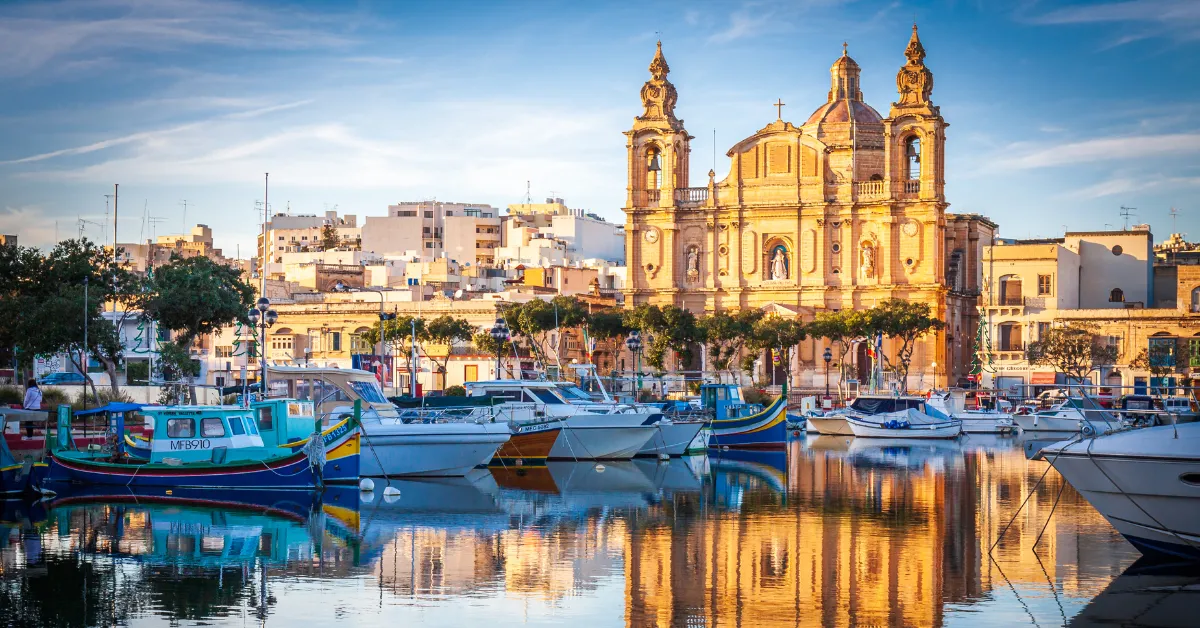Looking for an island to call home? Before you pack up your home, sell your possessions to strangers on the internet, and book a one-way ticket to Europe, check out these pros and cons of living in Malta.
Situated in the Mediterranean Sea, south of Sicily, the island often gets mistaken as a part of Italy or Greece, but Malta has been its own independent nation since 1964, after breaking away from its past as a British colony.
Something you may not know is that the country of Malta is actually formed by an archipelago of three islands — Malta, Comino, and Gozo
Regardless of whether you’re a digital nomad or not, deciding to up sticks and move to a nation where you don’t know a soul is a bold thing to do and requires a little thought.
To ensure you’re making the right choice, keep reading and find out the biggest advantages and disadvantages of living in Malta.
Pros Of Living In Malta
There’s a reason why Malta is high on the list for many ex-pats across the world. There are plenty of pros to living in Malta, from its high-quality amenities to its status as a tax haven.
English Is An Official Language
Malta was once part of the British Empire. This reign lasted over 150 years and you can still see the influence that the crown had over the country in its language. While the residents speak fluent Maltese, almost all of them speak a surprisingly high level of English too.
Up to 88% of the island is able to converse in the British language, which makes your adjustment period somewhat easier.
Whether it’s negotiating a price for an apartment lease, ordering a meal, or trying to communicate that your air conditioning unit is broken, being able to speak the language you’re fluent in will help you to deal with anything that life throws at you.
Low Taxes
One of the advantages of living in Malta, and the main reason that the island has become so popular with ex-pats, is its excellent tax rates. Income tax is charged at 15% for those earning between €8,500 and €14,500.
Those in the next bracket of earners — between €14,500 and €60,000 — can expect to pay roughly 25% in taxes, while those over this threshold will pay 35%. This is lower than many EU countries, including Denmark, France, and Austria, where you’ll pay up to 56% depending on your salary.
You can also apply for tax residency in Malta without living in the country for 183 days, by obtaining domicile status. There are no taxes on inheritance, wealth, and in some cases, property.
Excellent Medical Care
Malta is known for its continual place in the top five countries for healthcare in the world, as ranked by the World Health Organization (WHO.) The island has both a public healthcare system and a private one.
The former is free and accessible to anyone who pays national insurance. The hospitals are modern and treatment is swift.
If you intend to live in Malta for more than three months, you can apply for an E-121 form, which will entitle you to access free healthcare. However, many ex-pats choose private healthcare, particularly if their aim is to live in the country short term.
Generally, these private services are affordable and provide excellent patient care. You can expect to pay around $20 for a standard doctor’s appointment and if you require a specialist for your health concern, you’ll pay upwards of $60 to see one.
Safe Country
Another benefit of living in Malta is safety. Feeling safe can be a top concern for many ex-pats when looking for their new home, particularly if they’ll be living there solo.
The good news with Malta is that it’s one of the safest countries in Europe, and of the crimes that do happen, most tend to be non-violent.
While it’s possible to get mugged or scammed as a foreigner, generally you’ll feel perfectly safe roaming the island’s streets. Of course, you should use your common sense and ensure your valuables are secure and you pay attention to your surroundings. However, you do not need to feel on edge or overly cautious in Malta as you would in many other countries around the world.
Healthy And Delicious Cuisine
It’s extremely easy to eat nutritious food while in Malta, as there is an abundance of outlets serving up fresh and wholesome meals. While you can expect to pay a premium for these nourishing ingredients, you can find them anywhere on the island.
Vegetarians and vegans will find eating in Malta to be a breeze, with plenty of juices, smoothies, and salads.
The island’s national dish is stuffat tal-fenek — a hearty rabbit stew made with tomatoes, and a variety of herbs and spices. Rabbits were not originally native to the island of Malta but were instead introduced by the Phonecians.
Each family makes the stew in their own traditional way and recipes are passed down among family members for generations.
One common factor between all of these recipes is how the meat is prepared. The rabbit is cooked slowly until the meat is tender and falling off the bone. This results in a succulent dish that is best served with potatoes or bread.
Cons Of Living In Malta
Unfortunately, there is no perfect destination that checks all the boxes. While there are plenty of reasons to pack up and move to the Mediterranean island, there are also several cons to living in Malta.
It’s down to you to decide whether the benefits outweigh the disadvantages.
High Pollution Levels
Many people are surprised and disappointed to find that Malta is one of the most polluted countries in Europe.
Despite its dreamy island appearance, Malta has been severely impacted by traffic, agriculture, and industrial pollution and is ranked the fourth most polluted nation in the European Union (EU.)
Of the 27 member states, only Bulgaria, Poland, and Greece outrank the tiny island nation. In fact, research constantly supports the idea that over 500 people a year die prematurely in Malta, due to air pollution alone, with no other risk factors.
If you wish to avoid this issue, you should consider living in a rural or beach-side location, instead of in the capital city of Valletta.
Poor Transportation
One of the main disadvantages of living in Malta is its lack of transportation options. Despite the island’s high level of pollution, basic public transport infrastructure has not been installed to support its communities in improving air quality.
Residents outside of Valletta use private cars to travel around the island.
However, if you do not wish to rent or buy a car, you’ll have to rely on the bus system. While public transport is affordable with the Tallinja card, there are no train, metro, or tram options. These limitations mean that buses can often be overpopulated and unreliable.
Densely Populated Country
Another con of living in Malta is how heavily populated the European destination is. The island is the most densely populated location in the EU, with over 1,250 residents per square kilometer, and an overall population of 464,000.
It is also one of the most densely populated countries in the world, falling behind destinations, such as Bangladesh and Bahrain.
This is because the country imports a lot of labor work from other nations to support its increasing economy. Its low taxes also drive a large number of foreigners to the island. It is estimated that the number of residents on the island will reach almost 670,000 by 2050.
Crowded Beaches
Complaining about crowded beaches may seem to be a petty thing to make you reconsider a move to Malta, but it’s a valid concern for anyone wanting to relocate to a sandy destination.
One of the draws of moving to an island is watching the sunset with a beer in hand from a beach-side café or sand dune.
However, Malta’s location means that towering cliffs and pebbly beaches are more common than sandy bays. Due to the population explosion in Malta, the few beaches that are scattered around the edges of the island are often brimming with fellow sunseekers.
The most paradisiacal beaches in Malta include Golden Bay, Ir-Ramla il-Hamra, and the Blue Lagoon.
Final Thoughts On Living In Malta
Now you’ve discovered the biggest pros and cons of living in Malta, is it still top of your relocation list? If you’re a digital nomad wanting to increase the profit margin in your business, Malta is a great option to consider.
Those who want to have an easy adjustment period will also find that Malta fits the bill. However, if you’re easily affected by poor air quality or enjoy your personal space, you may wish to look elsewhere.
If you’re still searching for the perfect place to call home, check out these posts:
- Pros and cons of living in Amsterdam
- Pros and cons of living in Poland
- Pros and cons of living in Cyprus
Do you have your travel insurance?
- ☑ SafetyWing offers affordable travel medical insurance. Prices start at $45.08 / 4 weeks.
- ☑ Created by nomads, for nomads.
- ☑ Covers quarantine and Covid-19.
- ☑ You can pay per month, and stop at anytime.


